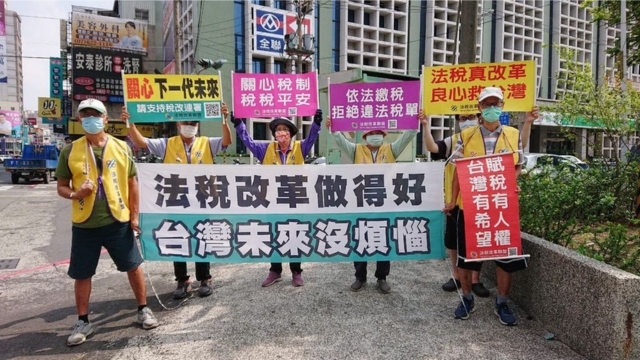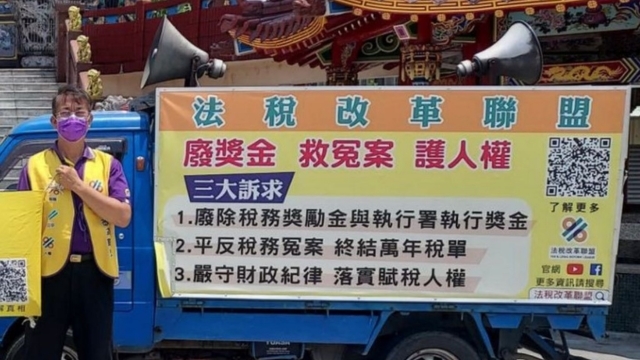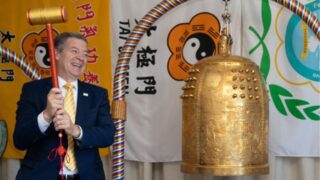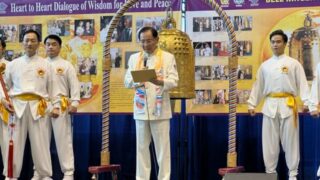Yi Chan walked for thirteen days witnessing for tax and legal reform and arrived in Kaohsiung on May 20, the day of love.
by Massimo Introvigne


Meet Yi Chan, a volunteer who embarked on a walking tour around Taiwan from Taipei, driven by the aspiration of making Taiwan a better place. On the thirteenth day of his walking tour, Yi Chan had covered a distance of 382.7 kilometers as part of his mission to advocate for tax and legal reform in Taiwan. On May 20th, known as the Day of Love, he arrived in Kaohsiung.
This is a special day for Chinese-speaking young people, a day celebrating love. 5-20, or 520, is a way of indicating May 20. The Chinese pronunciation for “five two zero” sounds like “I love you.”


The picture you see above shows Yi Chan in the center, wearing typical Taiwanese yellow slippers. On the 19th day of his journey, after walking approximately 510 kilometers, he arrived at the southernmost point of Taiwan, the Eluanbi Lighthouse. This lighthouse is one of the four lighthouses that illuminate Taiwan from east to west and north to south. Yi Chan explained that these lighthouses symbolize shining a beacon of hope in the sea of uncertainty, representing the guiding light in the darkness and the hope for the country to follow the right path. Yi Chan plans to continue his journey by completing visits to the four lighthouses in the east, west, south, and north of Taiwan, with the expectation of finishing his walking tour by the end of June.
It was a long walk indeed. However, the encouragement and support Yi Chan received along the way bolstered his determination to keep moving forward. In Miaoli, a temple caretaker at Tongxiao’s Cihou Temple, “took care of him like a mother,” in Yi’s own words, and served him a lunch with the famous Tongxiao fried buns. Furthermore, sympathetic people drove more than forty minutes from Yunlin County just to deliver breakfast to Yi, expressing their concern and support.


Finally, Yi concluded his journey on the day of love, May 20, at the famous Qishan Tianhou Temple in Kaohsiung, which is home to Mazu, the Holy Mother of Heaven. He offered prayers and blessings for his beloved Taiwan while holding a banner advocating for tax and legal reform.
Yi’s was a pilgrimage of love but also of justice. Indeed, the message he wanted to convey is that true love cannot be separated from justice. He indicated that he engaged in the arduous walk for expressing three wishes: true reform of laws and taxes in Taiwan, saving Taiwan with conscience, and solving the Tai Ji Men case.


Yi is a dizi (disciple) of Tai Ji Men, a menpai (similar to a school) of qigong, martial arts, and self-cultivation that was among the victims of a politically motivated crackdown on spiritual and religious movements accused of not having supported the ruling party in the presidential elections of 1996. The Shifu (Grand Master) of Tai Ji Men, his wife, and two dizi were arrested and accused of fraud and tax evasion, and the movement was hit by an unprecedented amount of media slander orchestrated by the prosecutor who had started the case. Eventually, all Taiwanese jurisdictions up to the Supreme Court found the Tai Ji Men defendants innocent of all charges, including tax evasion.
However, ignoring the Supreme Court decision, the National Taxation Bureau (NTB) maintained its ill-founded tax bills. It took many years to persuade them to reduce these bills to zero, which finally they did for all years except 1992. They claimed that for 1992 a final decision has been rendered—although on the substance the case of 1992 was not different from the others, and obviously “final” decisions can always be revised when they are clearly wrong. Nonetheless, the NTB went on, until in 2020, based on the 1992 tax bill, land regarded as sacred by Tai Ji Men and intended for a self-cultivation center was confiscated, unsuccessfully auctioned off, and seized.


This generated widespread Tai Ji Men protests in Taipei’s streets. Their case also led Tai Ji Men dizi to study in depth the problems of Taiwan’s tax system, joining others in the Tax and Legal Reform League. They found that their case was not unique, and that many individuals and businesses had suffered from the arbitrary actions of the NTB. They also traced part of the problem back to the system of bonuses given to bureaucrats who, rightly or wrongly, enforce tax bills.
Yi’s tour was aimed at spreading love and the primacy of conscience, the main values promoted by Tai Ji Men at home and internationally, but also at making his fellow Taiwanese becoming more aware of the systemic tax justice problems. On May 20, the Tax and Legal Reform League organized a nationwide awareness day calling for the “Abolition of bonuses, rectification of fabricated cases, and protection of human rights.”


Both Yi’s walking tour and the campaign were very successful. From motorcycle and car drivers to local villagers, young men and women, and the elderly, many told Yi how moved they were from his testimony, and listened to him as he shared his ideas about tax justice, love, and conscience.


Yi Chan expressed his determination to continue walking, aiming to encircle Taiwan step by step, offering prayers and blessings to the country. He hopes that, through his journey, officials will also listen to the voices of the people.









